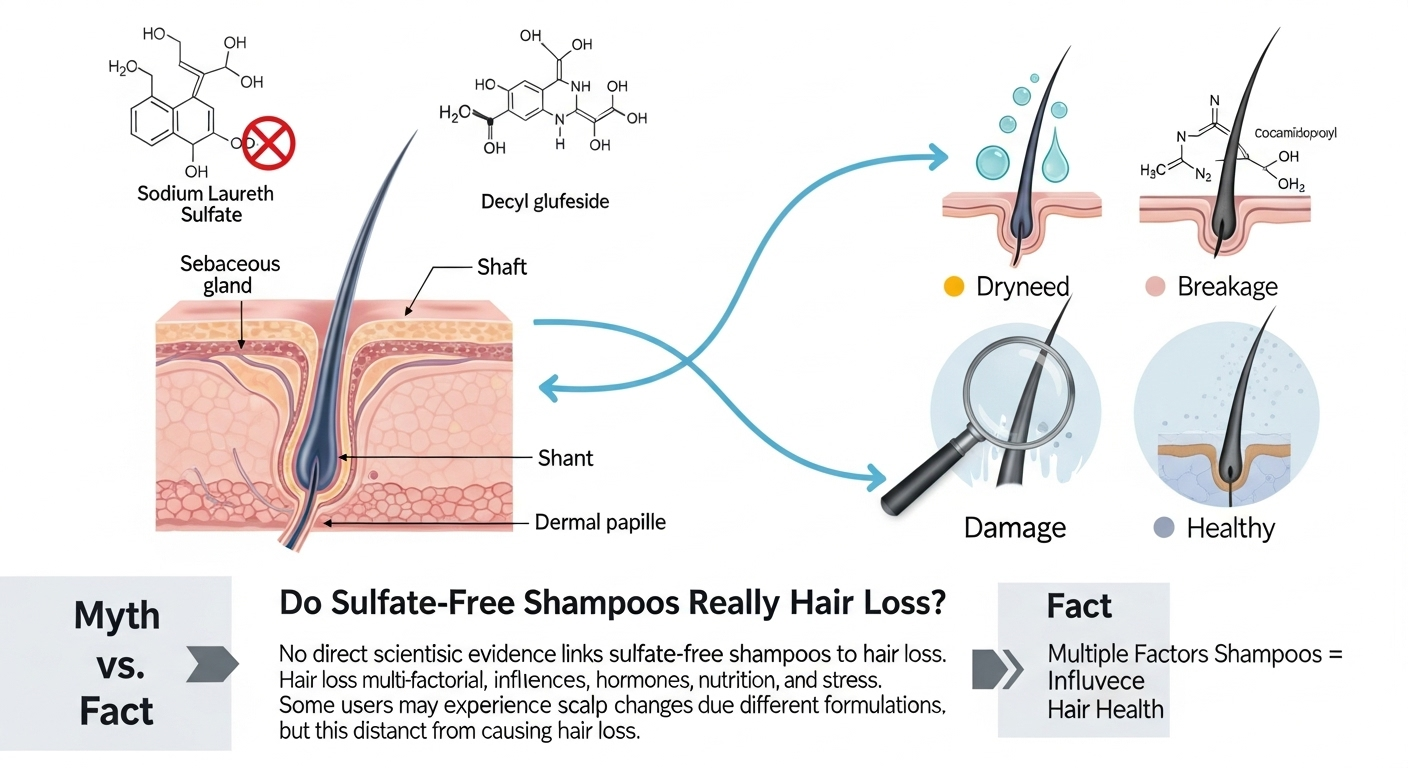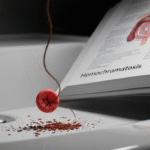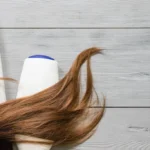Worried your hair’s thinning ever since switching shampoos? You’re not alone. Many people ask, do sulfate free shampoos really cause hair loss, especially when they notice more shedding in the shower. In this guide, we’ll break down what sulfate-free shampoos actually do, separate myths from science, and help you protect your hair health with confidence. …
Worried your hair’s thinning ever since switching shampoos? You’re not alone. Many people ask, do sulfate free shampoos really cause hair loss, especially when they notice more shedding in the shower.
In this guide, we’ll break down what sulfate-free shampoos actually do, separate myths from science, and help you protect your hair health with confidence. With expert insights and real case examples, you’ll know exactly what’s going on—and what to do next.
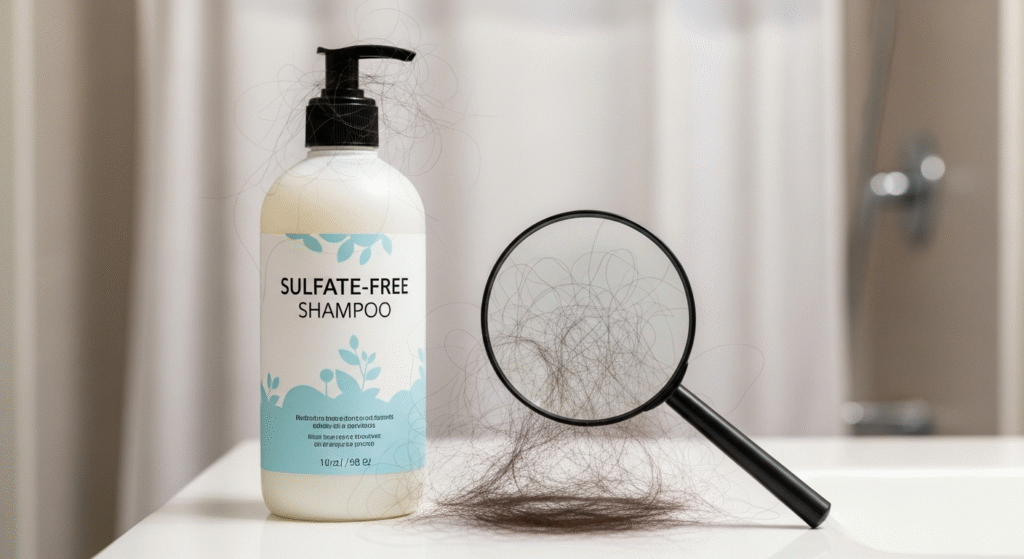
What Are Sulfate Free Shampoos?
Sulfate-free shampoos are exactly what they sound like—shampoos that don’t contain sulfates, which are harsh detergents commonly found in many personal care products.
Common Sulfates in Regular Shampoos
- Sodium Lauryl Sulfate (SLS)
- Sodium Laureth Sulfate (SLES)
These ingredients create that rich lather many people associate with “clean,” but they can also strip away natural oils and irritate sensitive scalps.
Why People Switch to Sulfate-Free Options
- Reduce scalp irritation or dryness
- Protect colored or chemically treated hair
- Retain natural moisture in curly or textured hair
Benefits Often Attributed to Sulfate-Free Products
- Gentler on the scalp
- Help with frizz and breakage
- Better for long-term hair health
The Science Behind Hair Loss
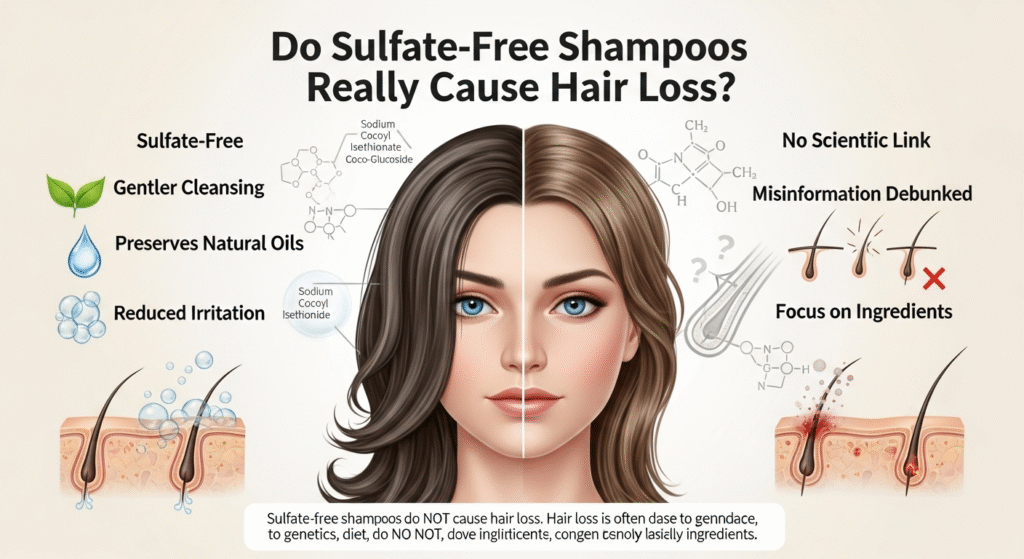
Hair loss can be distressing, but understanding what causes it can help reduce anxiety and guide proper treatment.
Normal Hair Shedding vs. Actual Hair Loss
- Normal shedding: Losing 50–100 hairs daily is completely normal.
- Hair loss: Noticeable thinning, bald patches, or excessive fallout may indicate an underlying issue.
Common Causes of Hair Loss
- Genetics (e.g., androgenetic alopecia)
- Hormonal changes (e.g., pregnancy, menopause, thyroid disorders)
- Stress or trauma
- Poor nutrition
- Underlying conditions (e.g., alopecia areata)
Can Hair Products Alone Trigger Hair Loss?
Not typically. While harsh chemicals can damage the scalp or shaft, they rarely affect the hair follicle, which is responsible for growth. However, using the wrong product for your hair type can exacerbate existing issues.
Do Sulfate Free Shampoos Really Cause Hair Loss?
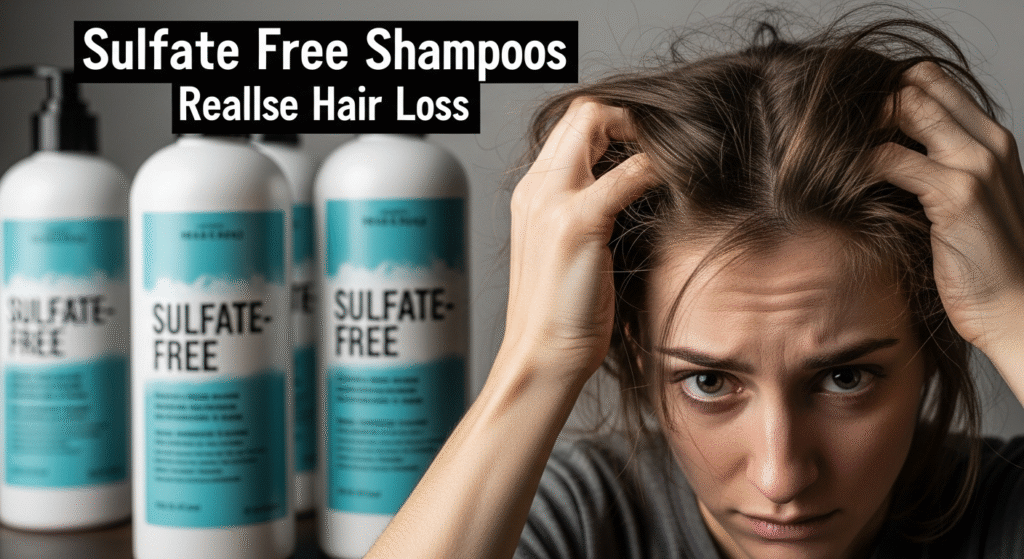
Let’s get to the heart of the concern.
Clinical Studies & Scientific Literature
There is no clinical evidence that sulfate-free shampoos cause hair loss. In fact, many studies recommend sulfate-free options for:
- Chemically treated hair
- Patients with scalp conditions like seborrheic dermatitis
- Individuals recovering from hair transplants
Anecdotal Evidence vs. Peer-Reviewed Data
Some users do report increased shedding after switching to sulfate-free shampoos—but this is often due to transitional changes, not the shampoo itself. In contrast, peer-reviewed data finds no direct correlation between sulfate absence and follicle damage.
Factors That Might Make Sulfate-Free Shampoos Seem Problematic
So why do people associate hair loss with sulfate-free products?
Transition Shedding — What It Is and Why It Happens
When you switch from a clarifying or sulfate-rich shampoo to a gentler formula, your scalp may initially purge buildup and excess sebum. This can lead to temporary increased shedding, known as transition shedding.
Good news? It typically lasts 2–4 weeks.
Product Build-Up & Scalp Health Issues
Sulfate-free shampoos often contain milder cleansing agents that might not remove oils or styling residue effectively—especially if you’re using silicone-heavy conditioners or dry shampoo. This can:
- Clog hair follicles
- Trigger scalp inflammation
- Impair healthy growth
Pro Tip: Use a clarifying shampoo once every 2–4 weeks to reset your scalp.
Choosing the Wrong Formula for Your Hair Type
Sulfate-free doesn’t mean “one-size-fits-all.” For example:
- Oily scalps may need tea tree or salicylic acid-infused versions
- Dry scalps may benefit from formulas with aloe vera or argan oil
- Fine hair requires lightweight cleansers, not heavy butters or oils
How to Choose the Right Sulfate-Free Shampoo
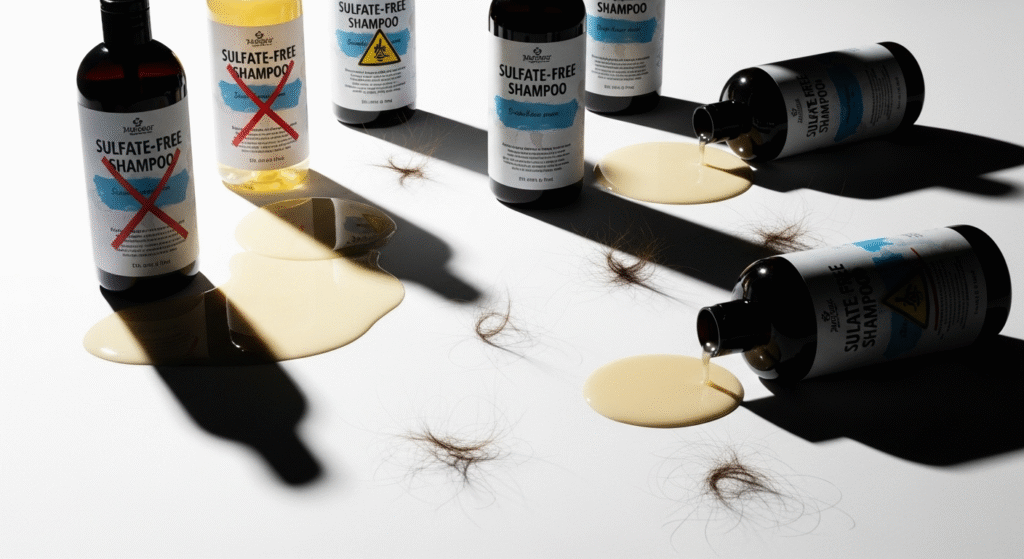
Choosing wisely can make a huge difference.
Ingredients to Look For
- Biotin – supports keratin production
- Keratin – strengthens hair shafts
- Niacinamide – supports scalp health
- Caffeine – promotes blood circulation
Avoiding Harsh Replacements
Just because it’s “sulfate-free” doesn’t mean it’s gentle. Avoid:
- Cocamide DEA (linked to scalp irritation)
- Heavy alcohols like isopropyl alcohol
- Over-fragranced products
Matching Formulas to Your Scalp Type
- Dry scalp: Look for glycerin, shea butter, or hyaluronic acid
- Oily scalp: Go for lightweight, balancing cleansers
- Sensitive scalp: Choose fragrance-free or hypoallergenic formulas
Expert Tips to Prevent Hair Loss When Changing Shampoo
Take these steps to ease the transition:
Gradual Transition vs. Immediate Switch
If you’re experiencing irritation or heavy buildup:
- Alternate sulfate and sulfate-free products during the first two weeks
- Use scalp brushes to improve blood flow and exfoliate gently
Scalp Massage, Diet, and Supplementation
- Massage 3–5 mins daily with oils like rosemary or peppermint
- Eat protein-rich foods, leafy greens, and omega-3s
- Consider supplements with biotin, zinc, and vitamin D
When to See a Dermatologist or Trichologist
- If shedding lasts longer than 6 weeks
- If there are signs of inflammation or scarring
- If family history suggests genetic thinning
What’s the best shampoo for hair regrowth?
Look for clinically tested ingredients like:
- Minoxidil (topical treatment)
- Caffeine-based shampoos
- DHT-blocking shampoos (saw palmetto, ketoconazole)
Final Verdict: Should You Be Worried?
When It’s Not the Shampoo
In most cases, the problem isn’t the product—it’s:
- Mismatched formula
- Poor scalp hygiene
- Underlying stress or medical conditions
Situations That Need Medical Attention
- Hair falling out in clumps
- Itching, burning, or lesions
- Sudden onset of bald spots
If in doubt, always consult a specialist.
FAQs
Can sulfate-free shampoos cause dandruff?
Not directly, but poor cleansing can lead to product buildup, which may worsen flaking. Pair your shampoo with a mild exfoliating scrub if needed.
Should I avoid sulfates if I have thinning hair?
Yes—sulfates can be harsh on fragile hair shafts. Sulfate-free formulas help retain moisture and reduce breakage, especially for fine or aging hair.
Is it safe to use sulfate-free shampoo daily?
Yes, provided it’s suited to your scalp type and thoroughly cleanses. Just monitor for any residue buildup and adjust accordingly.
Ready To Take Your Next Step
Still unsure if your shampoo is helping or harming your hair? Our specialists can analyze your scalp, review your current routine, and recommend solutions tailored just for you.
Book a consultation with Dr. Uzma Irfan, an ISHRS-certified surgeon in Islamabad today to ensure your hair care routine supports—not sabotages—your hair health.

